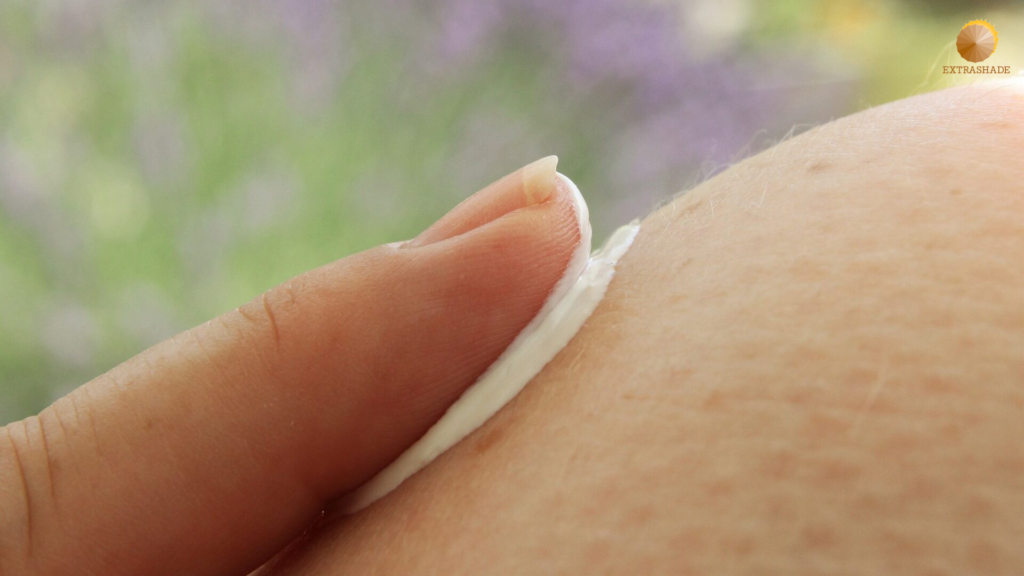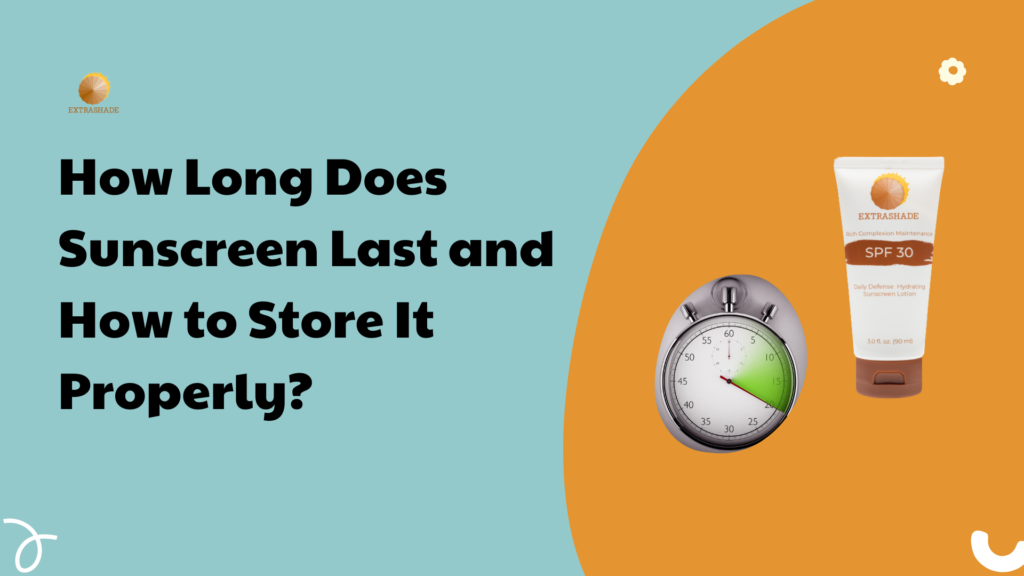Protecting your skin from sun damage isn’t just about applying sunscreen — it’s about knowing if it’s still effective. Many people unknowingly use expired or improperly stored sunscreen, leaving their skin vulnerable to harmful UV rays.
If your sunscreen has been sitting in your car, beach bag, or bathroom cabinet for months (or even years), its potency might be compromised. And using degraded sunscreen is no different than skipping protection altogether.
In this guide, we’ll talk about how long does sunscreen last and how to store it properly. So, without further ado, let’s dig deeper.
5 Reasons Why Sunscreen Is Important
i. Protects your skin from sunburn
Sunburn is a painful and unsightly condition that can be prevented by wearing sunscreen. The sun’s ultraviolet (UV) rays can damage the skin’s DNA, leading to sunburn. Sunscreen helps to protect the skin from UV rays by absorbing or reflecting them.
ii. Reduces your risk of skin cancer
Skin cancer is the most common type of cancer in the United States. UV rays from the sun are a major cause of skin cancer. Sunscreen helps to protect the skin from UV rays, which can help to reduce your risk of developing skin cancer.
iii. Prevents premature aging
UV rays from the sun can damage the skin’s collagen and elastin, which can lead to premature aging. Sunscreen helps to protect the skin from UV rays, which can help to prevent wrinkles, age spots, and other signs of premature aging.
iv. Evens out your skin tone
UV rays from the sun can cause uneven pigmentation, which can lead to dark spots and patches on the skin. Sunscreen helps to protect the skin from UV rays, which can help to even out your skin tone.
vi. Makes your skin look healthier
Sunscreen helps to protect the skin from UV rays, which can help to keep your skin looking healthy and radiant.
Different Types of Sunscreen
- Mineral sunscreens work by sitting on top of the skin and reflecting or scattering UV rays away. They are typically made with zinc oxide or titanium dioxide, which are minerals that are naturally opaque to UV rays. Mineral sunscreens are often considered to be more gentle on the skin than chemical sunscreens, and they are also less likely to cause allergic reactions.
- Chemical sunscreens absorb UV rays and convert them into heat, which is then released from the skin. Chemical sunscreens are typically more lightweight and cosmetically elegant than mineral sunscreens, and they are also more effective at protecting against UVA rays. However, some people find that chemical sunscreens can irritate their skin.
- Combination sunscreens contain both mineral and chemical sunscreen ingredients. This type of sunscreen can offer the best of both worlds, providing both physical and chemical protection against UV rays.
- Sports sunscreens are designed to be water-resistant and sweat-proof, making them a good choice for people who are active outdoors.
- Kids’ sunscreens are formulated for sensitive skin, making them a good choice for children.
No matter which type of sunscreen you choose, it is important to apply it liberally and evenly to all exposed skin 20 minutes before going outdoors. You should also reapply sunscreen every two hours, or more often if you are sweating or swimming.
Tips for Choosing and Using Sunscreen

- Choose a sunscreen with an SPF of 30 or higher.
- Look for a sunscreen that is broad-spectrum, which means it protects against both UVA and UVB rays.
- Choose a sunscreen that is water-resistant, if you will be sweating or swimming.
- Apply sunscreen to all exposed skin, including your face, ears, neck, and lips.
- Reapply sunscreen every two hours, or more often if you are sweating or swimming.
How Long Does Sunscreen Last?
The shelf life of sunscreen depends on whether it is opened or unopened.
- Unopened sunscreen
According to the FDA, sunscreens are required to remain effective for at least three years. This means that you can use leftover sunscreen from one year to the next. However, it is always best to check the expiration date on the bottle. If the sunscreen does not have an expiration date, write the date of purchase on the bottle and throw it out after three years.
- Opened sunscreen
Once sunscreen is opened, it will start to lose its effectiveness over time. The exact shelf life of opened sunscreen varies depending on the product, but it is generally recommended to replace it after one to two years.
Best Ways to Keep Your Sunscreen in Good Condition
Here are some tips on how to keep your sunscreen in good condition. Let’s get cracking.
- Check the expiration date
Most sunscreens have a shelf life of 3 years, but it’s always a good idea to check the expiration date before using it. If the sunscreen is expired, it may not be as effective at protecting your skin from the sun.
- Store sunscreen in a cool, dry place
Sunscreen should be stored in a cool, dry place, out of direct sunlight. Heat and moisture can degrade the ingredients in sunscreen, making it less effective.
- Avoid leaving sunscreen in your car
The heat inside a car can quickly degrade sunscreen, so it’s best to avoid leaving it in your car. If you must leave sunscreen in your car, make sure to keep it in the glove compartment or trunk, where it will be less exposed to heat.
- Don’t use sunscreen that has been opened or used
Once sunscreen has been opened, it should be used within 12 months. After 12 months, the ingredients in sunscreen can start to break down, making it less effective.
- Rinse sunscreen off your skin after swimming or sweating
Sunscreen can wash off your skin when you swim or sweat. It’s important to rinse sunscreen off your skin and reapply it after swimming or sweating to maintain protection from the sun.
Some Additional Tips
- Choose a sunscreen with an SPF of 30 or higher. The SPF (sun protection factor) measures how well a sunscreen protects your skin from UVB rays, which are the main cause of sunburn. An SPF of 30 means that it will take 30 times longer for your skin to burn when you’re using sunscreen than when you’re not using sunscreen.
- Look for a sunscreen that is broad spectrum. Broad spectrum sunscreen protects your skin from both UVA and UVB rays. UVA rays cause premature aging, while UVB rays cause sunburn.
- Choose a sunscreen that is water resistant. If you’re going to be swimming or sweating, choose a sunscreen that is water resistant. Water resistant sunscreen will stay on your skin longer and provide more protection from the sun.
Chemical vs. Physical Sunscreens
Chemical and physical sunscreens are the two main types of sunscreen available. They work in different ways to protect your skin from the sun’s harmful UV rays.
Chemical sunscreens
- Work by absorbing UV rays into the skin and converting them into heat, which is then released from the body.
- Are generally more lightweight and cosmetically elegant than physical sunscreens.
- Can be more effective at protecting against UVA rays, which are responsible for skin aging and cancer.
- May be more irritating to the skin, especially for people with sensitive skin.
- Some chemical sunscreen ingredients have been linked to coral reef damage.
Physical sunscreens
- Work by sitting on top of the skin and reflecting UV rays away from the skin.
- Are generally more moisturizing and less irritating to the skin than chemical sunscreens.
- May not be as effective at protecting against UVA rays as chemical sunscreens.
- Can leave a white cast on the skin, especially on darker skin tones.
Which Type of Sunscreen is Right for You?
There is no clear winner when it comes to chemical vs. physical sunscreens. The best type of sunscreen for you will depend on your individual needs and preferences. If you have sensitive skin, physical sunscreen is a good choice. If you are looking for a sunscreen that is lightweight and easy to apply, a chemical sunscreen may be a better option.
Over to You
In conclusion, it is crucial to understand the expiration date and storage guidelines for sunscreen in order to ensure its effectiveness. Sunscreen typically lasts for about three years, but it is important to check the specific expiration date on the bottle. Storing sunscreen properly, in a cool and dry place away from direct sunlight, will help maintain its potency.
Additionally, regularly applying sunscreen every two hours and after swimming or sweating is vital for adequate protection against harmful UV rays. By following these guidelines and taking proper care of your sunscreen, you can enjoy the benefits of sun protection while keeping your skin safe and healthy. So remember, when it comes to sunscreen, always check the expiration date and store it properly for maximum effectiveness.


